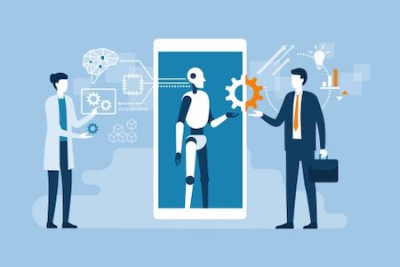Embracing AI in Finance and Accounting: Balancing Risk and Innovation

Co-authored with Guest Contributor Rachel Cappell
Until the public release of ChatGPT, most of us considered the notion of a human-like artificial intelligence like the HAL supercomputer in the movie 2001, or Data, the AI-powered android from Star Trek, something we were unlikely to see in our lifetimes. But as people use new powerful AI tools like ChatGPT and BARD for everything from setting meeting agendas to writing personal letters, shopping lists, and even poetry, an AI-powered future seems likely to become a reality sooner rather than later. AI coupled with The Digitization of the Finance Function create powerful levers for today’s CFO.
The emergence of accessible artificial intelligence (AI) has sparked a revolution comparable to the advent of the internet, web browser, and cloud computing. This technology offers unprecedented rewards, but it also presents new risks that we all must navigate.
What is Artificial Intelligence?
A term often shrouded in ambiguity; AI represents systems capable of performing tasks that usually require human intelligence. It is distinct from artificial general intelligence (AGI), which refers to AI systems with broad capabilities equivalent to human intelligence (like HAL and Data). Current AI models, unlike AGI, excel in specialized tasks, evident in applications like spam filters, Netflix recommendations, auto-complete features, and product recommendations. ChatGPT, the current star of the AI world, has brought unprecedented attention to the field, and has users considering its impact, and the implications on our futures.
What is ChatGPT?
ChatGPT is a specific type of AI called a large language model or LLM. LLMs have demonstrated remarkable capabilities. Their strengths lie in their ability to,
- generate human-like text,
- understand context, and
- provide information across a broad range of topics.
This makes them versatile tools in various fields such as education, customer service, and even creative writing. However, LLMs also have inherent weaknesses. They lack a genuine understanding of the world, and their responses are based purely on patterns they’ve learned during training, not on personal experience or subjective interpretation. Additionally, they can sometimes produce incorrect or misleading information, particularly on topics updated beyond their last training data or when asked to predict or speculate about future events.
AI in the “Real World”
While these powerful tools seem to have a near mastery of natural language communication, they are not necessarily designed to possess many of the skills required by finance and accounting professionals. They’re not very good at mathematics or dealing with numbers in general. While other AI models are far superior to humans in their ability to perform complex mathematics and spot trends, patterns, and variances across a broad swath of data, LLMs are not. However, they still have a place in corporate finance and accounting.
LLMs are already reshaping the productivity landscape across the business world, including finance and accounting departments. They can generate,
- drafts for presentations,
- emails, and
- reports,
saving employees time and effort on routine tasks.
Using these AI tools in their current state in sensitive areas like finance and accounting raises security concerns. While these tools can streamline operations, they may also inadvertently disclose proprietary or sensitive information if not properly managed. Therefore, it’s crucial to have robust data governance policies in place when implementing AI, ensuring that the software only has access to the necessary data and is monitored for any unusual or potentially harmful activity.
How to use AI in Finance & Accounting
As we look to the future, the role of AI in finance will likely expand. AI driven automation is expected to extend to more complex tasks such as,
- audits,
- risk management, and
- financial planning and analysis.

With the pending release of ChatGPT plugins that can do everything from browse the internet to write computer code, an array of additional functionalities such as real-time analytics, advanced forecasting, and intelligent customer service are coming in the very near future.
With all these great new capabilities at our fingertips, the future will also require constant vigilance and regular updates to security protocols as AI systems become more sophisticated and the risk landscape evolves. Training, like CFO.University’s Introduction to Risk Management, and awareness programs will also become crucial to help employees understand how to use these AI tools responsibly and effectively. With the right precautions and strategies, AI has the potential to revolutionize the finance sector, driving innovation, efficiency, and growth.
As AI permeates finance, questions about its compliance with audits and financial governance will arise. For instance, could financial statements generated by ChatGPT withstand audit scrutiny? Whether ChatGPT applications could pass a SOC-1 audit, a crucial certification for control over financial reporting, remains to be seen.
System and Organization Controls (SOC) reports are critical components in the controls infrastructures of any company relying on third party systems and applications in the production of financial data and reports. Essentially, third party applications/systems engage an external audit firm to review and test the design and operation of their IT and finance/business controls. An unqualified, or “clean” SOC report audit opinion from a PCAOB certified audit firm is enough to allow companies to rely on any output from the system/application in question and use it as an input in financial statements. For example, if a company uses ADP for payroll services, a SOC report issued for ADP by an external auditor would certify that companies can rely on the information in any reports generated by ADP, and the Company can then use those reports to record payroll transactions in their books and financial statements. If ChatGPT and similar applications can achieve SOC or equivalent certification, it could trigger a transformative impact on finance and accounting departments, ushering in a new era of AI-driven financial management.
But will such SOC reports be sufficient to test ChatGPT plugins to the point of reliability for public companies subject to a PCAOB audit, or audits by other organizations and in other countries/continents? Or will a new type of audit need to be designed which specifically contemplates the rapidly changing LLM landscape? How will ChatGPT plug in applications address cybersecurity, especially as public company cybersecurity requirements become more stringent? All of this remains to be seen, as the audit and accounting industry contemplates how to apply the core principles of sound financial controls to this emerging mercurial space.
Meanwhile, fine-tuning AI models for specific finance and accounting tasks is a promising but costly endeavor. Companies like Google and Amazon are investing heavily in AI R&D to customize models for their needs. Fine-tuned AI models could assist with complex regulatory requirements, such as those from IFRS, FINRA, and the SEC.
Bloomberg, the largest business and financial information aggregator in the world, recently fine-tuned an LLM to be an expert at finance by training the model on a 50-billion-word corpus of the company’s proprietary financial data.
With a large and diverse enough data set (e.g. SEC filings, GAAP documentation, FASB accounting standards, IFRS standards, PCAOB, FINRA, etc.), a model could be trained to become an expert in finance and accounting. By integrating this model with other tools – both AI-powered and general computational capabilities – a true “robot” expert could be created capable of handling tasks such as financial statement analysis, risk assessment, forecasting, and compliance with accounting standards.
In a world that embraces and rewards AI, “Leaning in” to this technology is not optional for finance and accounting. AI is the proverbial locomotive that has already left the station, it beckons to be understood and channeled amid the risky and rugged terrain of the corporate landscape. Finance and accounting professionals must overcome our risk aversion in favor of innovation and efficiency to remain ahead of the curve – and avoid obsolescence. Even more, we must square off with the power of AI to be responsible stewards of our clients’ and customers’ best interests. As with all other nascent technologies, opportunities abound, and the finance and accounting community can catalyze the changes that enable the global corporate community to seize the day.
Coupled with the teaching from Glenn and Rachel above, the series, A Practical Approach to Using Artificial Intelligence, provides you with a roadmap for your AI journey in finance.
Enjoy the adventure!
Identify your path to CFO success by taking our CFO Readiness Assessmentᵀᴹ.
Become a Member today and get 30% off on-demand courses and tools!
For the most up to date and relevant accounting, finance, treasury and leadership headlines all in one place subscribe to The Balanced Digest.
Follow us on Linkedin!
